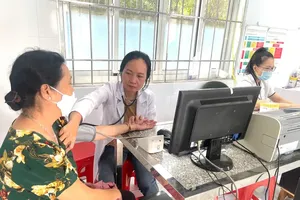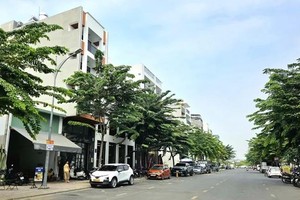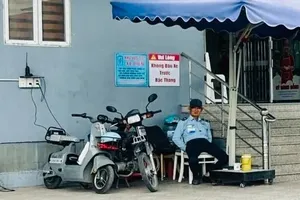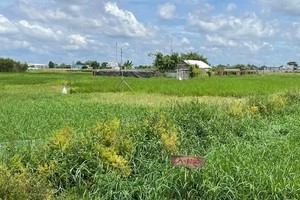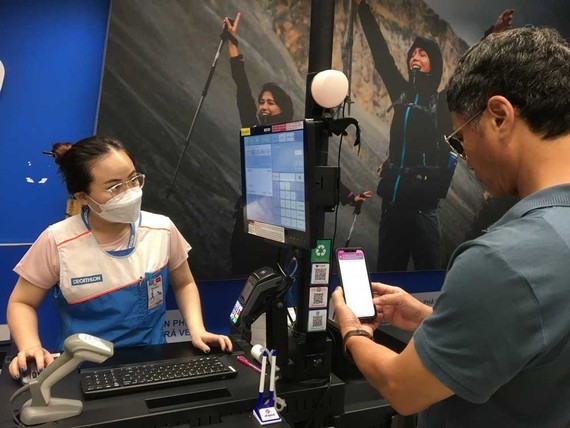 A customer uses smarphone to pay for an item
A customer uses smarphone to pay for an item
Undergoing liver transplantation at Ho Chi Minh City University of Medicine and Pharmacy Hospital for nearly 4 years, Mr. Nguyen Van Dien hailing from the Mekong Delta Province of Long An has registered for a follow-up examination with a chip-based citizen identification card (CIC) for the first time. Although he brought all the documents upon arriving at the hospital, the hospital staff just needed his CIC which contains information about health insurance and social insurance. Mr. Dien remembered in the old days, there were no CICs with a chip, so it took a long time to register for medical examination, and patients had to show their identity cards and health insurance cards.
Meanwhile, Ms. Phan Thi Tuyet from the Northern Province of Thanh Hoa also used a CIC with a chip integrated with health insurance and social insurance cards at Thu Duc City Hospital. After completing the medical examination process, Ms. Tuyet went to the hospital fee payment area and it only took about 5 minutes to make the payment without having to pay cash.
Previously, since the Ministry of Health's guidance, at the end of February 2022, the Ho Chi Minh City University of Medicine and Pharmacy Hospital has equipped medical machinery and equipment and provided training to hospital staff on the implementation of sign-up for medical examination and treatment for insured patients using a chip-based CICs. The synchronization of health insurance and social insurance card data into CICs with the chip is convenient for people as well as helpful in saving time for medical staff.
However, until now, few people know about and use CICs with chips for medical examination and treatment. In addition, some people have special CICs which have not yet integrated their health insurance and social insurance cards while others do not know if their cards have been integrated or not.
According to Associate Professor Do Anh Dung, Head of the Ho Chi Minh City University of Medicine and Pharmacy Hospital’s Department of Public Health, despite advantages, the implementation of medical examination and treatment using a chip-mounted CICs or a VneID electronic identification account still has had hiccups along the way including unsynchronized database system from the central to the local level.
Last but not least, despite many conveniences, the implementation of medical examination and treatment with chip-based CICs is still difficult when hospitals have to equip more devices to read QR codes. For the form of registration for medical examination and treatment by VneID electronic identification account, very few people have so far used it due to difficulties in registering an account.
In the past few days, at the online public service point under the Government's Project 06 (or the Project on developing the application of population data, identification and electronic authentication for national digital transformation in the period 2022-2025, with a vision to 2030) in the Landmark apartment building in HCMC’s Binh Thanh District’s ward 22, many apartment residents were instructed by public servants of Binh Thanh District Police to use online public services through computers and smartphones. Plus, people were also supported to register for an electronic identity account on the VNeID application and receive a CIC application with an electronic chip.
Police officers in Ho Chi Minh City are continuing to digitize data in the city and prepare conditions to connect specialized data with the Ministry of Public Security’s electronic data warehouse for administrative procedures.
Until now, Ho Chi Minh City Police has issued more than 1.5 million applications for CICs and more than 95,000 applications for ordinary passports for Vietnamese citizens. The police of Ho Chi Minh City have also directed their peers in districts, Thu Duc City to sign a commitment that all of the residence notice documents are made on the Public Service Portal. At the same time, police stations in districts and Thu Duc City were assigned to actively develop and implement many good solutions for administrative reform, especially in the implementation of the Project 06 and online public services.
48-year-old Hoang Dung brought his health insurance card, vehicle papers, and driver's license to integrate a second-grade electronic identification account. After completing the procedures, Mr. Dung said he will come back to integrate the motorcycle license and other papers.
Meanwhile, Mr. Tran Van Minh, 32, was specifically instructed by the police to use online public services in the areas of residence, traffic, fire prevention and rescue. A leader of the Police Department of Ward 22 in Binh Thanh District said that the unit receives registrations from 20 accounts using online public services; 25 registration dossiers for temporary residence, stay, permanent residence and temporary absence every day. The unit also answers dwellers’ questions daily.
Major Bui Huu Nghia, Captain of the Social Order Administration Team in District 3, said that in order to best serve people in making chip-based CICs, police officers were divided into two shifts working from 7 am to 10 pm every day even on Saturday and Sunday.
In addition, a police station in District 3 arranged two more machine venues at the ward police station to serve those who come to the police station to make CICs with chips, Major Bui Huu Nghia shared.






